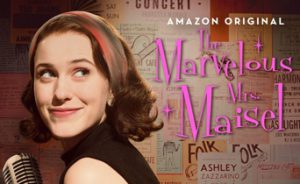All of the best traits and very few of the worst traits of hat-loving TV producer Amy Sherman-Palladino are present in the delightful “Marvelous Mrs. Maisel,” which recently hit Amazon Prime with an eight-episode first season. Along with “Gilmore Girls” and “Bunheads,” call it a career hat trick.
The latest star plucked from obscurity
While Sherman-Palladino and her husband, Daniel Palladino, haven’t been the luckiest when working with networks (“GG” was handed off to another producer for its seventh season and “Bunheads” was canceled prematurely), they’ve been fortunate in another way: They have now found three unproven-at-the-time actresses to absolutely nail their dense-but-fast-paced dialog. As aspiring comedienne Midge Maisel, Rachel Brosnahan joins Lauren Graham and Sutton Foster in that pantheon.
Some have theorized that because “Maisel” is set in 1958, it naturally curbs the Palladinos pop-culture references, which can be distracting ephemera more so than smart writing. But additionally, this series is so much more tightly written than last year’s “Gilmore Girls: A Year in the Life” (also a streaming venture where they had lots of creative control) that I have to think they learned some lessons.

“The Marvelous Mrs. Maisel” Season 1 (2017)
Amazon Prime, 8 episodes
Creator: Amy-Sherman Palladino
Stars: Rachel Brosnahan, Alex Borstein, Tony Shalhoub
There are times when “Maisel” almost goes too far – a successful comedienne (Jane Lynch) is nearly an upper-crust cartoon in her home life, and a dance number in Midge and Joel’s (Michael Zegen) wedding had me bracing for Life & Death Brigade excess. But it stops short.
Amazon Prime clearly spent serious money making “Maisel” look like 1958 New York, from the Upper West Side apartments of the Maisels and Midge’s parents, Abe (Tony Shalhoub) and Rose (“Once and Again’s” Marin Hinkle), to the gloriously grungy Gaslight, Midge’s home comedy base. (If Midge is using the men’s restroom to prepare before a show, how disgusting must the women’s restroom be?)
But it never feels like the Palladinos are showing it off. They just let the scripts – all written by them, except for one by Sheila R. Lawrence — sing and the settings shine.
An entertaining lesson about the Fifties
“Maisel” gives me that joyful feeling of learning about an era – late 1950s comedy, the rise of the independent woman, Jewish culture on the Upper West Side – while being totally entertained and therefore unaware that I’m soaking up knowledge.
Another big reason for “Maisel’s” success is the cast. Brosnahan is classically pretty, but not too absurdly perfect. Whereas Lorelai and Rory could eat anything without gaining an ounce, “Maisel” is more grounded. Midge gets up before Joel, fixes her face and hair, then returns to bed so he thinks that’s how she naturally looks. Later, we see Rose does the same thing. It’s not until the final episode that she’s comfortable scarfing down a mac-and-cheese dish because she’s hungry.
Midge – who by the way (and it truly is a “by the way”) has two kids with Joel — behaves properly because she knows no other way. But it subconsciously chafes at her, and it leads to boffo material for her comedy sets, which start off spontaneous before becoming a “tight 10” by the end of the eight episodes.
The brash Susie (Alex Borstein in a glorious “Oh, so that’s why the Palladinos love her” performance), who is often mistaken for a man in a running gag, sees Midge’s natural talent. Susie gives Midge a tour of the comedy scene and points out comics to learn from, guides her through her first awful performances and explains that everybody bombs, and gets her a gig opening for Lenny Bruce (Luke Kirby, portraying a real-world comedian to give verisimilitude to the fictional Mrs. Maisel) – perhaps a sign that she has made it.
Borstein, Shalhoub battle for best performance
Borstein is neck-and-neck with Shalhoub for the best performance. Abe is a humorless 1950s father and mathematics professor, but the actor infuses the role with a touch of Monk-ishness. There’s something naturally amusing about how Shalhoub’s characters see insane behavior as perfectly sensible.
We can also sympathize as he navigates an idea that is crazy to him: That Midge would get a job as makeup-counter clerk. He keeps returning to the room with another question (“Are they paying you?,” “Do you have a bank account?”), and with each affirmative response, he absorbs it and gives a quiet “OK.”
“Maisel” is a woman’s world – set in the early days of America becoming a more equal place — and the men may have to settle for being “sympathetic,” but they do have arcs – notably Joel. An aspiring (but untalented) comedian himself, he starts off making us think “What kind of idiot would leave Midge?” but he ends up defending her to strangers.
The social rules of the time negatively affected men, too: His reason for walking out is not disappointment in Midge, but in himself. “Maisel” is not political theater; it doesn’t blame men for women’s plight. Indeed, Joel is surprised to learn that Midge’s bra hooks leave marks on her skin every day, and when he finally sees an un-made-up Midge one morning, he’s not at all disappointed.
“Maisel” might have the deepest cast of well-drawn characters since “Once and Again” (I didn’t even mention Kevin Pollak as Joel’s very Jewish dad), which similarly explored the people who branch off from a divorce. Season 1 could stand on its own as a crisp portrayal of a specific time, place and profession, channeled into the glowing life-force of Midge, but there’s more story to tell. Thankfully, we’re gonna get a Season 2.
Click here to visit our “Gilmore Girls,” “Bunheads” and “Marvelous Mrs. Maisel” Zone.


